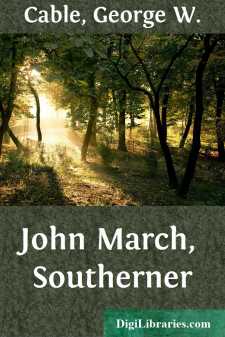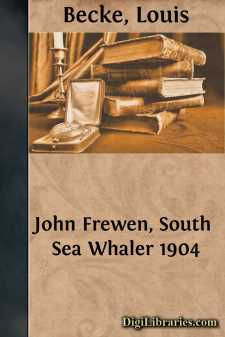Fiction
- Action & Adventure 180
- Biographical 15
- Christian 59
- Classics 6965
- Coming of Age 5
- Contemporary Women 3
- Erotica 8
- Espionage/Intrigue 12
- Fairy Tales, Folklore & Mythology 236
- Family Life 169
- Fantasy 117
- Gay 1
- General 596
- Ghost 32
- Historical 808
- Horror 43
- Humorous 160
- Jewish 25
- Legal 4
- Medical 22
- Mystery & Detective 315
- Political 49
- Psychological 41
- Religious 64
- Romance 159
- Sagas 11
- Science Fiction 730
- Sea Stories 113
- Short Stories (single author) 537
- Sports 10
- Suspense 1
- Technological 8
- Thrillers 2
- Urban Life 31
- Visionary & Metaphysical 1
- War & Military 173
- Westerns 199
Fiction Books
Sort by:
by:
George W. Cable
SUEZ In the State of Dixie, County of Clearwater, and therefore in the very heart of what was once the "Southern Confederacy," lies that noted seat of government of one county and shipping point for three, Suez. The pamphlet of a certain land company—a publication now out of print and rare, but a copy of which it has been my good fortune to secure—mentions the battle of Turkey Creek as...
more...
by:
John Masefield
I first met John M. Synge at the room of a common friend, up two pairs of stairs, in an old house in Bloomsbury, on a Monday night of January, 1903. When I entered the room, he was sitting in a rush-bottomed chair, talking to a young man just down from Oxford. My host introduced me, with the remark that he wanted us to know each other. Synge stood up to shake hands with me. He was of the middle height,...
more...
CHAPTER I. EARLY LIFE AND CALL TO THE MINISTRY, 1505-1547. On the sixteenth day of January, 1546, George Wishart delivered a remarkable sermon in the church of Haddington. Two things had combined to produce special depression in his heart. Shortly before he entered the pulpit a boy had put into his hands a letter informing him that his friends in Kyle would not be able to keep an appointment which they...
more...
Take a board with 64 squares on it. Put a grain of wheat on the first square—two on the second—four on the third. Keep doubling in this manner and you will find there isn't enough wheat in the world to fill the sixty-fourth square. It can be the same with compound interest. On the 201st day of the year 3221 A.D., the professor of history at the University of Terra seated himself in front of...
more...
On the evening of Thanksgiving day, John Inglefield, the blacksmith, sat in his elbow-chair, among those who had been keeping festival at his board. Being the central figure of the domestic circle, the fire threw its strongest light on his massive and sturdy frame, reddening his rough visage, so that it looked like the head of an iron statue, all aglow, from his own forge, and with its features rudely...
more...
CHAPTER I. If you take the Underground Railway to Whitechapel Road (the East station), and from there take one of the yellow tramcars that start from that point, and go down the Commercial Road, past the George, in front of which starts—or used to stand—a high flagstaff, at the base of which sits—or used to sit—an elderly female purveyor of pigs’ trotters at three-ha’pence apiece, until you...
more...
JOHN HENRY SMITH ENTRY No. I Miss HARDING Is COMING "Heard the news?" demanded Chilvers, approaching the table whereMarshall, Boyd, and I were smoking on the broad veranda of the WoodvaleGolf and Country Club. We shook our heads with contented indifference.It was after luncheon, and the cigars were excellent. "Where's LaHume?" grinned Chilvers. "Where's our Percy? He must...
more...
CHAPTER I "Get out o' Mr. Fletcher's road, ye idle, lounging, little—" "Vagabond," I think the woman (Sally Watkins, once my nurse), was going to say, but she changed her mind. My father and I both glanced round, surprised at her unusual reticence of epithets: but when the lad addressed turned, fixed his eyes on each of us for a moment, and made way for us, we ceased to...
more...
JOHN GAYTHER'S GARDEN The garden did not belong to John Gayther; he merely had charge of it. At certain busy seasons he had some men to help him in his work, but for the greater part of the year he preferred doing everything himself. It was a very fine garden over which John Gayther had charge. It extended this way and that for long distances. It was difficult to see how far it did extend, there...
more...
by:
Louis Becke
CHAPTER I Captain Ethan Keller, of the Casilda of Nantucket, was in a very bad temper, for in four days he had lost two of the five boats the barque carried—one had been hopelessly stove by the dreaded "underclip" given her by a crafty old bull sperm-whale, and the other, which was in charge of the second mate, had not been seen for seventy hours. When last sighted she was fast to the same...
more...











